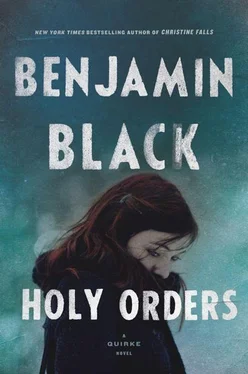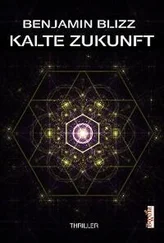“I don’t know,” Quirke said. “I must have blacked out somehow and dreamed the whole thing. But it wasn’t like a dream — it felt completely real.”
He was still staring before him, frowning hard. Isabel had the image of a man trapped in a dark maze, groping his way along leaf-strewn paths, helplessly. “Had you been drinking?” she asked.
“No, no — I told you, it was morning.”
She allowed herself a wry smile. “That wouldn’t necessarily mean you were stone-cold sober. Anyway, you probably had a hangover, like every other morning.”
He gave her a dark and louring look. “You don’t understand,” he said. “It wasn’t that kind of experience.”
“People have nervous attacks,” she said. “They imagine the strangest things. I had an aunt—”
“It wasn’t anything to do with my nerves,” Quirke snapped through gritted teeth.
“I’m only trying to—”
“I know, I know. I’m sorry.” He picked up the second whiskey and drank it off in one go, throwing his head back, and put down the empty glass, wincing, and making that hissing sound again. Isabel reached out to touch his hand but he drew away from her, pretending not to have noticed her gesture. “Let’s go,” he said, stepping down from the stool. “I don’t want to drink any more.”
The sun had gone and it was twilight in the streets now, and there was the metallic smell of rain on the way. Seagulls were swooping in great circles above the dome of the Rotunda Hospital. Isabel took Quirke’s arm and pressed it against her side. “I’m cold,” she said. He did not reply, and seemed not to have heard.
They went to his flat. She insisted that he sit in the armchair at the fireplace and went into the kitchen and made coffee. When she came back into the living room he was sitting as she had left him, hunched forward with his forearms resting on his thighs, gazing emptily at the unlit gas fire. “Put a match to that, will you?” she said. “It’s bloody freezing in here.”
While he fumbled with the matches she set down his cup on the coffee table beside the armchair. When he had lit the fire he sat back in the chair. His cheeks had a grayish tinge. She knelt in front of him, with her fists on his knees. “Are you worried?” she said.
He blinked; he seemed to be having difficulty focusing on her. “What do you mean?”
“About this — whatever it was, this blackout, this nervous attack.”
His eyes slid away from hers. “I don’t know,” he said. “If I could understand it, I could deal with it. As it is I’m just puzzled. I—”
The telephone rang, causing them both to start. Quirke made to rise but she would not let him. “Leave it,” she said. “Whoever it is will call back.”
But he put his hands on her shoulders and pushed her to one side and rose from the chair and stepped past her. She almost lost her balance and had to hold on to the chair arm to keep from falling over. Both her kneecaps were sore from kneeling. She was suddenly angry.
Quirke crossed to the telephone and picked up the receiver.
“Dr. Quirke?” the voice said. “Honan is the name. Father Michael Honan.”
Quirke had an aversion of long standing to Flynne’s Hotel. It was not the threadbare carpets or the greasy armchairs or even the pervasive smell of boiled cabbage that he most objected to. The place was a throwback, shoddily preserved from an older, harsher time. When he thought of Flynne’s he thought of cobwebs and musty dampness and the particular glistening blackish-brown shade of the varnish that was smeared over every inch of every exposed wooden surface, of floors, banisters, chair backs, even the flanks of the grandfather clock that stood in the shadows in the narrow lobby, half hidden by a tasseled brocade drape, ponderously ticking off the time that seemed to pass more slowly here than anywhere else.
Quirke’s father, or, rather, his adoptive father, Judge Garret Griffin, used to come in here on Sunday afternoons to drink whiskey with his cronies and swap courtroom gossip, and sometimes he would bring Quirke with him. Quirke recalled those seemingly interminable afternoons with a shiver. Garret had thought he was bestowing a rare treat on the boy, letting him sit with him and the other dusty denizens of the Law Library in a private dining room in the dim back regions of the hotel, surrounded by talk and tobacco smoke, a glass of fizzy orange slowly going flat on the table in front of him. And now, this evening, when he sprinted from the taxi — a shower was imminent — and climbed the granite steps and entered the lobby, his heart quailed before the awful familiarity of the place, while behind him, in the lamp-lit street, the inevitable April rain began to fall.
He made for the bar, and paused in the doorway. Low-wattage lamps in brackets on the walls lent a sullen glow to the flocked crimson wallpaper. The air reeked of turf smoke and the spicy tang of alcohol; he swelled his lungs with a deep draught of these mingled savors. He found bars like this dispiriting and yet mutedly exciting, too, despite himself. They were, he supposed, the kind of shabby-genteel place, dimly lit, forlorn, and slightly sinister, where he felt most at home.
And then of course there was the sense too of all sorts of louche possibilities, of chance encounters, of passing and, as it usually turned out, ill-advised liaisons. One night he had met a woman, in another bar in the city, and she had brought him here to Flynne’s, where she was staying, and they had spent the night together in her room. He recalled how they had crept past the night porter and up the creaking staircase. The woman had been a little tipsy, and had leaned against him, giggling, and whispering lewdly in his ear. On the first landing she had made him stop and turn and kiss her, and she had thrust her hand into his trousers pocket. This token of wantonness had filled him with sudden misgiving. What was her name? Anne? Amy? Aileen? Something like that. She told him she was a saleswoman for a Donegal weaving firm, down in Dublin to do the rounds of the big stores in hopes of securing orders. Her room was at the front of the hotel and looked down into a deserted Abbey Street. He noticed her slipping off her wedding ring and putting it under the pillow on what was going to be her side of the bed before she went into the bathroom. Between the sheets she had been unexpectedly shy. She swore she had never gone to bed like this with a strange man before, though he did not believe her. He liked her accent, the soft northern lilt of it. In the morning they did not know what to say to each other, and she turned away from him to fasten garters. Aine! That was her name. Aine from Inishowen, way up there in the wild north.
Now he stood in the doorway of the bar and scanned the room. Three priests sat around a small table near the fireplace, with drinks and a jug of water and an overflowing ashtray between them. In the fireplace a dolmen of turf logs was smoldering sullenly. The priests made Quirke think of a trio of magpies — was it three for bad luck? They were talking about a colleague, another priest, who had been summoned to Rome to work in the Vatican. “God, now,” one of them said in low, envious tones, a young man with black horn-rimmed glasses, “I wouldn’t mind being him. Rome! The fountains, they say, have to be seen to be believed.” The other two nodded, an Italianate radiance reflecting for a moment in their shiny, flushed faces.
Quirke’s eye moved on. Two elderly women in balding fur coats, one with a cluster of fake cherries pinned to the lapel, were ensconced in a corner, demurely sipping glasses of port. At a table in an opposite corner a young man and his girl were arguing with hushed ferocity. The girl wore a pillbox hat pinned to her hair at a sharp angle; each time she snapped a remark at the young man between clenched teeth the hat gave an inappropriately jaunty little nod. The boyfriend’s shirt collar was a couple of sizes too big for him and stuck up at the back. The barman was polishing a pint glass and whistling softly to himself. Quirke recognized the tune. “April Showers.”
Читать дальше












